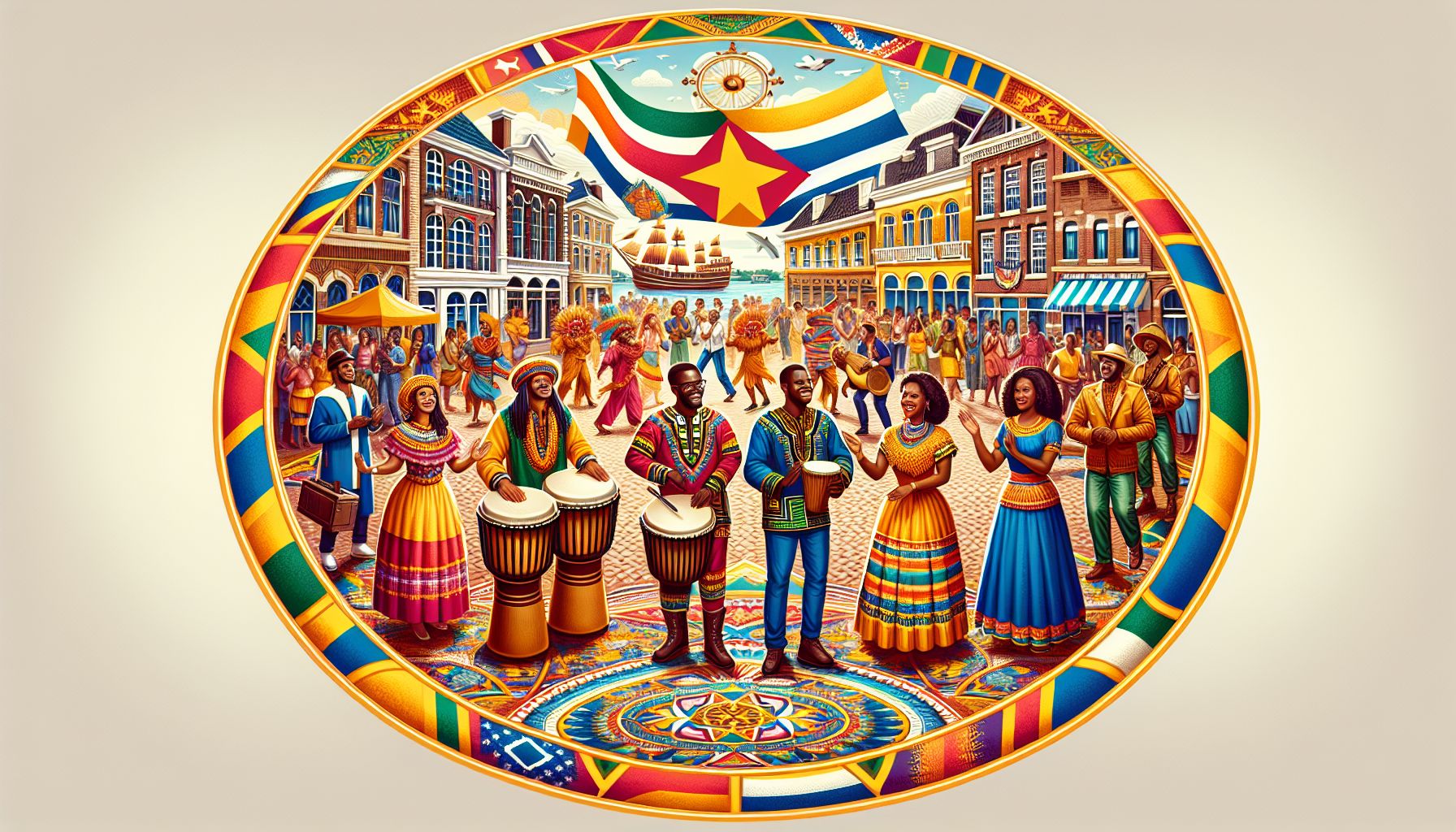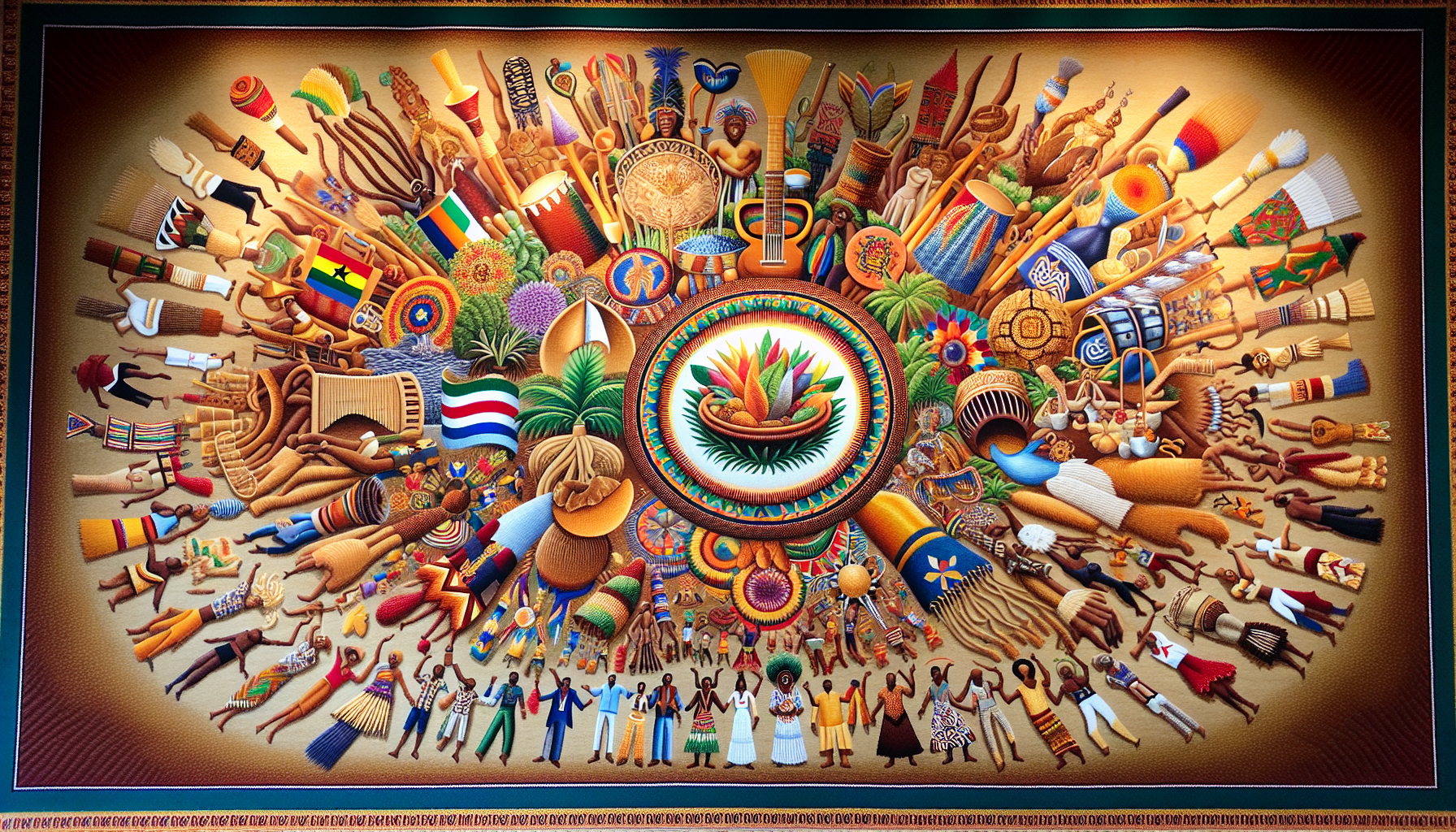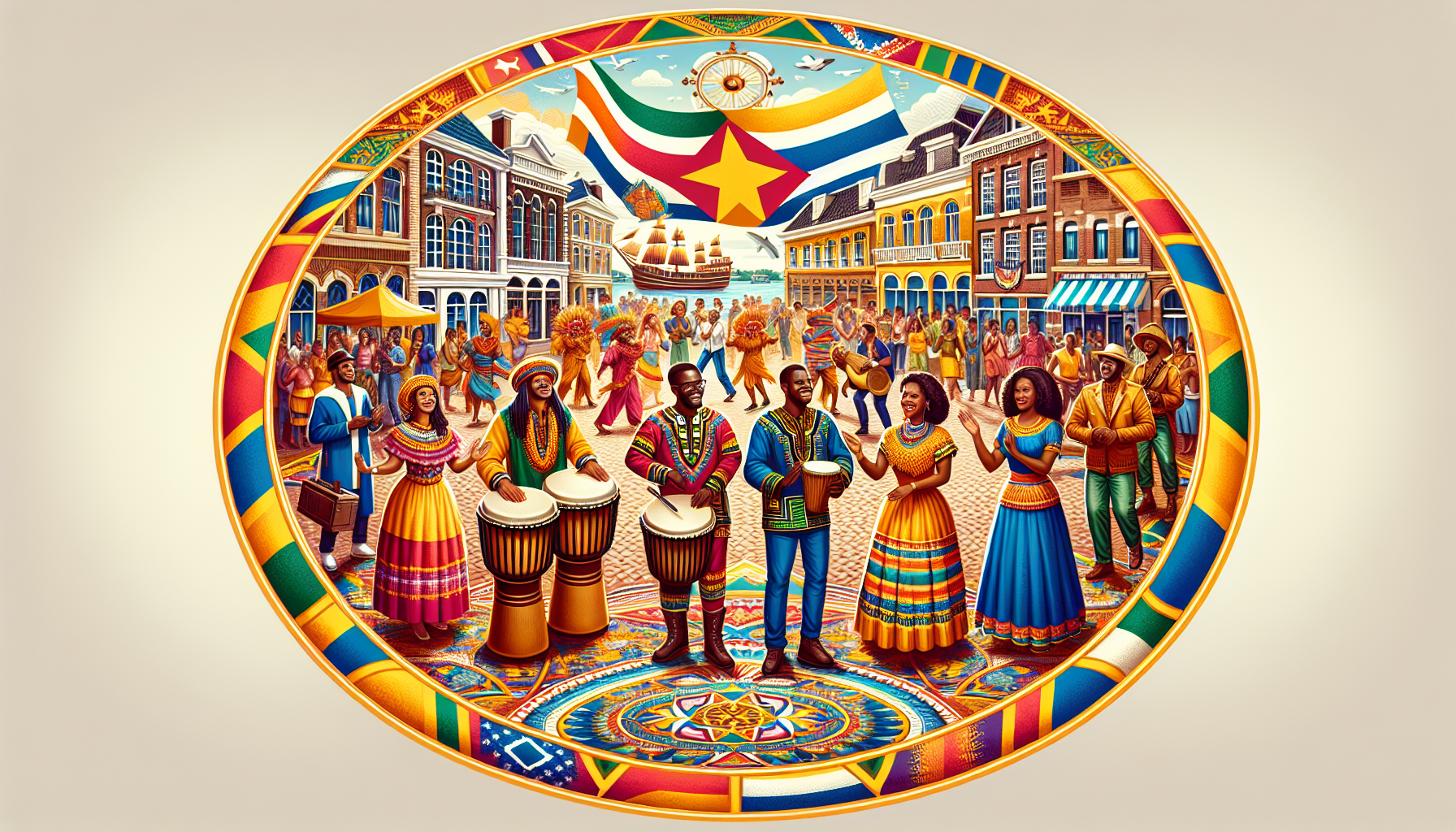Suriname, a hidden gem nestled in South America, offers an enchanting journey through its diverse culture. From indigenous tribes to descendants of African slaves, Suriname is a melting pot of rich traditions and heritage waiting to be discovered. Immerse yourself in the vibrant rhythms of traditional music, indulge in tantalizing Surinamese cuisine, and marvel at the architectural beauty that tells the story of centuries past. Get ready to embark on a captivating journey to explore the diverse and captivating culture of Suriname.
History of Suriname
Suriname’s history is deeply intertwined with its colonization by the Dutch. The Dutch colonial period, which spanned from the 17th to the 19th century, had a profound impact on the country’s culture and society. The Dutch brought African slaves to Suriname to work on sugar plantations, leading to the development of Afro-Surinamese culture.
However, Suriname eventually gained independence from the Netherlands in 1975. This marked a significant turning point in the nation’s history, as it paved the way for Surinamese people to reclaim their identity and embrace their cultural diversity.
Surinamese ethnic groups
Suriname is known for its rich ethnic diversity, with a population consisting of various ethnic groups. The indigenous peoples of Suriname, such as the Arawak and Carib tribes, have inhabited the region for centuries. Their unique traditions, practices, and crafts continue to contribute to the vibrant cultural landscape of Suriname.
The Afro-Surinamese community, descendants of enslaved Africans, have also played a significant role in shaping Surinamese culture. Influenced by their African heritage, they have developed distinct music, dance, and culinary traditions.
Javanese immigration to Suriname, which began in the late 19th century, led to the establishment of a vibrant Javanese community. Their cultural traditions, rituals, and cuisine have become an integral part of Surinamese society.
Additionally, Suriname is home to a large Hindustani community, descended from indentured laborers brought from India in the late 19th and early 20th centuries. Their religious practices, festivals, clothing, and jewelry reflect their rich cultural heritage.
The Chinese community in Suriname, which arrived in the late 19th and early 20th centuries, has also contributed significantly to the country’s cultural tapestry. Chinese cuisine, with its distinct flavors and culinary traditions, has become immensely popular in Suriname.

Indigenous Culture
The Arawak and Carib indigenous tribes have inhabited Suriname for centuries, preserving their rich cultural heritage. Traditional practices and customs continue to be passed down through generations, keeping their ancestral traditions alive. They have a deep connection with nature and believe in maintaining a harmonious relationship with the environment.
Indigenous arts and crafts are also highly valued in Surinamese culture. Intricate beadwork, woven baskets, and pottery are just a few examples of the beautiful craftsmanship displayed by the indigenous communities. These crafts not only serve as a means of artistic expression but also as a way to support their livelihoods.
Afro-Surinamese Culture
The Afro-Surinamese community has a compelling history rooted in the transatlantic slave trade. Enslaved Africans were brought to Suriname by the Dutch to work on sugar plantations, and their contributions have had a lasting impact on the cultural fabric of the country.
Maroon communities, formed by runaway slaves who escaped colonial plantations, have preserved many African traditions and customs. Their unique culture blends African and indigenous elements, creating a distinct identity within Surinamese society. Music and dance play a prominent role in Afro-Surinamese culture, with genres like kaseko and kawina showcasing their vibrant rhythms and powerful storytelling.

Javanese Culture
The Javanese community in Suriname has its roots in the mass immigration of Javanese laborers during the late 19th century. They brought with them their rich cultural heritage, including traditional practices, rituals, and the Javanese language.
Cultural traditions are an essential aspect of Javanese culture, with rituals such as slametan (religious feasts) and kenduri (thanksgiving ceremonies) serving as significant communal events. These rituals foster a sense of unity and serve as a platform for passing down cultural values and customs to future generations.
Javanese cuisine has also become an integral part of Surinamese gastronomy. Dishes like Nasi Goreng (fried rice), Soto (soup), and Tempeh (fermented soybean cakes) bring a unique blend of flavors and spices to Surinamese cuisine.
Hindustani Culture
The arrival of indentured laborers from India in the 19th and early 20th centuries laid the foundation for the vibrant Hindustani community in Suriname. Reflecting their diverse regional origins in India, Hindustani culture encompasses a wide range of languages, traditions, and customs.
Religious practices form an essential part of Hindustani culture, with Hinduism being the dominant faith. Festivals like Diwali (Festival of Lights), Ram Navami (Lord Rama’s birthday), and Holi Phagwa (Festival of Colors) are celebrated with great enthusiasm, bringing communities together to express their spirituality and cultural heritage.
Traditional clothing, such as the saree for women and the kurta pyjama for men, is still worn during special occasions and religious ceremonies. Elaborate jewelry, including bangles, earrings, and necklaces, further adds to the cultural identity of the Hindustani community.
Chinese Culture
Chinese immigration to Suriname began in the late 19th and early 20th centuries, primarily driven by economic opportunities. The Chinese community quickly became integrated into Surinamese society, bringing with them their rich cultural traditions.
Chinese cuisine has left a lasting impression on Surinamese gastronomy, with dishes like bami (stir-fried noodles), tjauw min (fried rice noodles), and Chinese-style barbecue becoming immensely popular. The use of unique spices and cooking techniques sets Chinese cuisine apart and adds tremendous flavor to Surinamese dishes.
Chinese temples, adorned with intricate artwork and designs, stand as a testament to the community’s strong religious beliefs. Festivals such as the Chinese New Year and the Moon Festival are celebrated with great fervor, showcasing the vibrant cultural heritage of the Chinese community in Suriname.
Indigenous Cuisine
Indigenous cuisine in Suriname is characterized by its use of locally sourced ingredients and traditional cooking methods. Cassava, a staple crop, forms the basis of many indigenous dishes. It is used to make bread, pancakes, and beverages like cassiri (a fermented cassava drink).
Indigenous communities have a deep understanding of the local flora and make use of various fruits and vegetables unique to Suriname. Examples include kankantri (a citrus fruit), tajerblad (edible taro leaves), and pawpaw (papaya). These ingredients are often incorporated into soups, stews, and salads, adding vibrant flavors to the indigenous cuisine.
Traditional cooking methods, such as smoking and grilling over open fires, are prevalent. These methods not only impart a distinct smoky flavor to the dishes but also reflect the deep connection indigenous communities have with their environment.
Surinamese Music and Dance
Suriname’s music and dance traditions are as diverse as its cultural landscape. Kaseko, a genre rooted in Afro-Surinamese culture, blends traditional African rhythms with Western influences. This energetic music form often features brass instruments, percussions, and powerful vocals, making it irresistible to dance to.
Kawina, another Afro-Surinamese music genre, focuses on traditional rhythms and songs. Combined with energetic dance movements, kawina creates an immersive cultural experience that has become an essential part of Surinamese celebrations and events.
Creole and Javanese dance forms also have a significant presence in Surinamese culture. These dance forms showcase the unique identities of the Afro-Surinamese and Javanese communities, respectively, and often reflect historical narratives and cultural traditions.
Religious Diversity
Suriname is a melting pot of religious diversity, with various faiths coexisting harmoniously. Christianity, Hinduism, Islam, and the indigenous Winti religion are all practiced in Suriname.
Christianity, brought by European colonizers, has a significant following in Suriname. Churches of different denominations dot the country, and Christian festivals such as Christmas and Easter are widely celebrated.
Hinduism, brought by the Hindustani community, is the most prominent religion in Suriname. Temples dedicated to different Hindu deities can be found across the country, and festivals like Diwali are celebrated with immense joy and fervor.
Islam, practiced by a sizable Surinamese community, has a strong presence in the country. Mosques provide spaces for worship, and festivals such as Eid ul-Fitr bring the Muslim community together to commemorate the end of Ramadan.
The Winti religion, practiced by the indigenous peoples of Suriname, is rooted in animistic beliefs and spiritual rituals. Winti combines elements of African, indigenous, and Christian traditions, making it a unique and important part of Surinamese religious diversity.
Festivals and Celebrations
Suriname is a country that loves to celebrate, with a multitude of festivals and events that showcase its cultural richness and diversity.
Holi Phagwa, also known as the Festival of Colors, is an exuberant Hindu festival celebrated by the Hindustani community. It involves the throwing of colored powders and water at each other, symbolizing the triumph of good over evil and the arrival of spring.
Eid ul-Fitr, the Muslim festival marking the end of Ramadan, is widely celebrated by Suriname’s Muslim community. It is a time for prayer, family gatherings, and feasting, as people come together to break their month-long fast.
Masquerade festivals, rooted in African and Afro-Surinamese traditions, are colorful and theatrical events that captivate both locals and visitors. Participants dress in elaborate costumes and masks, showcasing their creativity and celebrating their cultural heritage in vibrant parades and performances.
In conclusion, Suriname’s cultural diversity is both fascinating and remarkable. With a rich history shaped by colonization and immigration, the country is home to a myriad of ethnic groups, each with their own unique traditions, practices, music, dance, and cuisine. Suriname’s cultural tapestry, encompassing indigenous, Afro-Surinamese, Javanese, Hindustani, Chinese, and other influences, continues to thrive and evolve, making it a truly remarkable destination for those seeking to explore the vibrant and diverse cultures that make up Suriname.
